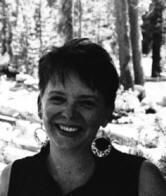![]()
I've known Lesley for sixteen years. She has been my editor, friend, mentor...and whatever else I needed her to be at any given time. Her knowledge of the art and craft of writing, as well as the overall makeup of the world in general, is truly amazing. I would not have survived this long as a writer were it not for her continuing encouragement and support. Thanks, my friend. Rock on!
![]()
Lesley Kellas Payne

I rely on my eyes for my livelihood, and they change often.
Even armed with a new prescription, I find once I am in the glasses store, a
building the size of a large warehouse with its walls lined with zillions of
frames, I become confused. Soon I can’t tell which frames make me look like one
of the chuckling chipmunks and which like a human being with professional
potential. After several abortive trips to the glasses warehouse alone, I now
take my daughter with me. She has a great eye for color and style. She can look
at me from the outside—objectively because of her discriminating “eye” and
because she wants me to look my best—and see which frames are most becoming to
my face.
When you write a novel, if you have cut the proverbial vein and invested
yourself in your work, created something only you could write, you are in it and
it is in you. While there are some accomplished writers who can distance
themselves from their work, see what is missing and what is on the page, for
many writers and virtually all aspiring writers, it is impossible to be sure
what is on the page. There may be missing facts, feelings, structure,
consistency, and logic of both the rational and emotional kinds. The writer may
automatically fill in the blanks with what she knows, thinks, feels. She can’t
be sure a scene evokes feelings because she may feel the feelings even if they
aren’t imbedded in the writing on the page. An objective, skilled editor can
assess the work and help assure that the writer looks his best on the page.
If objectivity is critical, perfected craft is essential. For reliable craft
assessment, explication and guidelines, you need the feedback of a professional,
not from a relative or friend who may lack necessary skills and be more
concerned with hurting your feelings than assuring your manuscript is craft
worthy, that it will represent you well in the marketplace. Our daughters or
second cousins may help us pick out glasses, but evaluating manuscripts and
coaching on the craft of fiction is a more complex activity that takes greater
objectivity as well as training. Ezra Pound had dreadful politics, but he was a
fine writer. He said that craft is the measure of sincerity. Craft is the
measure of commitment. Without craft being evident in work, it is unlikely your
submittal will be taken seriously by an agent for representation, by an editor
for publication.
As editors and book doctors, we are not required to pass an exam or submit to
licensure requirements as many professionals are. The creative effort, time, and
commitment that goes into drafting a novel is enormous. To risk all that in the
hands of someone “out there,” unknown and uncredentialed has always struck me a
bit like taking a newborn to a pediatrician who is neither board certified nor
known to you. The safest way to know whom to consult about your manuscript is by
personal recommendation of a fellow writer or another professional you trust,
such as an agent or another book doctor or editor. If you do not have that kind
of connection, ask for references and/or any other questions that seem relevant
to you. I am always surprised when prospective clients don't ask what my
education is,
how long I have been editing, what I like to read, what I know about the market,
or any of a number of other questions. You are hiring someone to perform a
service for you, a rather personal service, finally. Assure yourself in whatever
ways you can, but avail yourself of the professional services that can then
assure you that you are entering the marketplace with the best manuscript you
are capable of completing.
The key to a good critique is finding a reader who will respect, refine, and shape the vision you, the writer, believe in.
For more on finding the right frames for perfecting your manuscript, contact Lesley Kellas Payne by e-mail (lesleykp@hughes.net)
![]()
The future is not out there in front of us, but inside us. - Joanna
Macy
In the topside world, all is interpreted in the light of simple gains and
losses. In the underworld, all is interpreted in light of the mysteries of
true sight, right action, and becoming a person of intense inner strength and
knowing. - Clarissa Pinkola Estes
The creation of something new is not accomplished by the intellect but by the
play instinct acting from inner necessity. The creative mind plays with
the objects it loves. - C.G. Jung
Words are a form of action, capable of influencing change. - Ingrid Bengis
![]()
Lesley Kellas Payne is an independent fiction editor with decades of experience assisting writers in achieving publication and authors in enhancing their careers once published. She has presented workshops at writers’ conferences and through California State University, Fresno and University of California extension services. Payne’s clients represent every genre of fiction except hard science fiction and "glitz." Her keynote workshop, "Solving the Protagonist Puzzle," is included in The Portable Writers’ Conference.
![]()